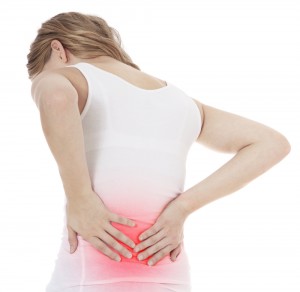The Signs & Symptoms of Back Pain
 The human back is a collection of 30 vertebrae held together by a series of ligaments, tendons and muscles. This critical structure must endure quite a bit of shock, but there are these disks which act as shock absorbers for the spinal cord. Unfortunately, problems can arise and this often leads to back pain. It should come as no surprise to hear that this is a condition which most people experience at least once in their lives.
The human back is a collection of 30 vertebrae held together by a series of ligaments, tendons and muscles. This critical structure must endure quite a bit of shock, but there are these disks which act as shock absorbers for the spinal cord. Unfortunately, problems can arise and this often leads to back pain. It should come as no surprise to hear that this is a condition which most people experience at least once in their lives.
Most cases are very mild and don’t require any form of treatment, but some are so severe that that surgery becomes the next best option (invasive procedures are usually the last resort option). Then again, some people have looked into viable clinical research opportunities as a way to deal with recurring back pain, especially when their symptoms don’t respond well to contemporary methods of treatment.
Back pain has been a staple in human society ever since the first person was able to stand up straight. Unfortunately, there are a wide range of circumstances that could lead to back pain. Many people are simply dealing with a lifetime of poor posture or recurring injury. Other cases are caused by things like:
- Significant accident
- Pulled muscles in the back
- Injuries resulting from some form of athletic competition
No matter what the original cause, most people will experience similar symptoms as a result of this medical condition.
Common Symptoms of Back Pain
Studies have shown that the most common symptoms associated with back pain include:
- Feeling achy or stiff at some point along the spinal cord for an extended period of time.
- Sharp or piercing pain that is localized at one point along the spine– this tends to occur following a pulled muscle as a result of overexertion in one way or another.
- Pain that radiates out from the lower back toward the buttocks all the way and all the way down the back of the thighs and calves into the toes.
- Unable to stand up completely straight without suffering intense muscle spasms that cause even sharper pains throughout the lower back.
- Chronic aching in the middle or lower region of the back– the pain intensifies after remaining inactive after an extended period of time.
(Quick Fact: A sharp or piercing pain in the upper back could also be an early warning indicating the onset of cardiac arrest or some other potentially deadly situation, so please be careful.)
Seek Medical Attention
Any of the following could indicate a situation where your back pain requires serious attention. Please call your doctor if:
- Your arms or legs begin to grow tingly, oddly weak or numb (could indicate serious spinal cord damage).
- Back pain intensifies whenever you bend over or cough (this could be a symptom of a herniated disk).
- You are also experiencing an odd burning sensation while urinating, you develop a fever or urine smells particularly odd (could indicate a more serious infection).
- You start to experience an peculiar issues with your bowels or bladder.
(Back pain that spreads down your back and legs could also be caused by a medical condition called sciatica.)
Remember that back pain is pretty common— odds are that you already know full well what it feels like. That being said, please make sure that you schedule a visit with your doctor if the back pain starts to become debilitating in any way. Many cases are needlessly exacerbated as the result of mismanagement and lack of proper treatment.